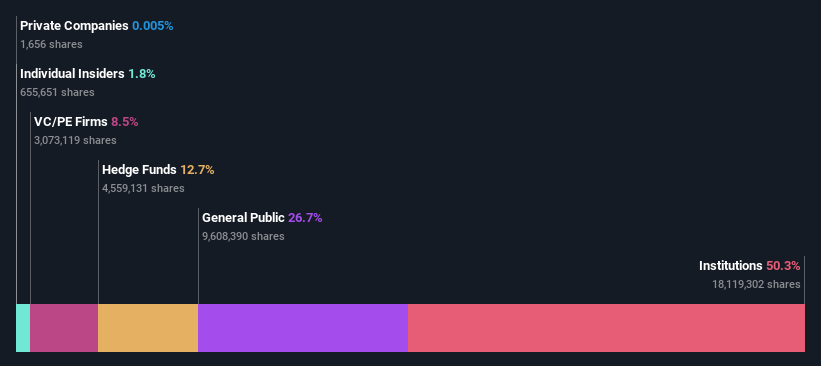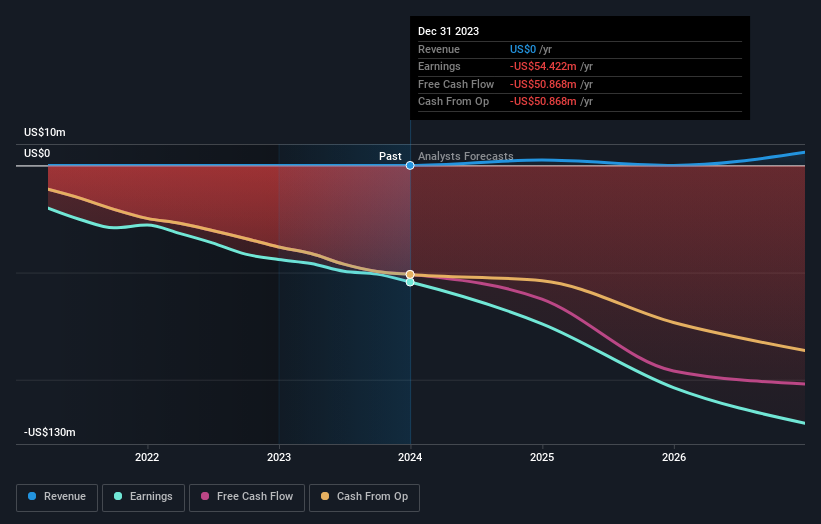Longboard Pharmaceuticals, Inc.'s (NASDAQ:LBPH) large institutional owners must be happy as stock continues to impress, up 8.2% over the past week
Longboard Pharmaceuticals Inc Ordinary Shares LBPH | 59.98 | Delist |
Key Insights
- Given the large stake in the stock by institutions, Longboard Pharmaceuticals' stock price might be vulnerable to their trading decisions
- A total of 8 investors have a majority stake in the company with 51% ownership
- Using data from analyst forecasts alongside ownership research, one can better assess the future performance of a company
Every investor in Longboard Pharmaceuticals, Inc. (NASDAQ:LBPH) should be aware of the most powerful shareholder groups. The group holding the most number of shares in the company, around 50% to be precise, is institutions. In other words, the group stands to gain the most (or lose the most) from their investment into the company.
And as as result, institutional investors reaped the most rewards after the company's stock price gained 8.2% last week. The gains from last week would have further boosted the one-year return to shareholders which currently stand at 460%.
Let's delve deeper into each type of owner of Longboard Pharmaceuticals, beginning with the chart below.
Check out our latest analysis for Longboard Pharmaceuticals

What Does The Institutional Ownership Tell Us About Longboard Pharmaceuticals?
Many institutions measure their performance against an index that approximates the local market. So they usually pay more attention to companies that are included in major indices.
We can see that Longboard Pharmaceuticals does have institutional investors; and they hold a good portion of the company's stock. This implies the analysts working for those institutions have looked at the stock and they like it. But just like anyone else, they could be wrong. If multiple institutions change their view on a stock at the same time, you could see the share price drop fast. It's therefore worth looking at Longboard Pharmaceuticals' earnings history below. Of course, the future is what really matters.

Institutional investors own over 50% of the company, so together than can probably strongly influence board decisions. It looks like hedge funds own 13% of Longboard Pharmaceuticals shares. That worth noting, since hedge funds are often quite active investors, who may try to influence management. Many want to see value creation (and a higher share price) in the short term or medium term. The company's largest shareholder is FMR LLC, with ownership of 17%. With 8.5% and 6.5% of the shares outstanding respectively, RA Capital Management, L.P. and Cormorant Asset Management, LP are the second and third largest shareholders. In addition, we found that Kevin Lind, the CEO has 1.0% of the shares allocated to their name.
On further inspection, we found that more than half the company's shares are owned by the top 8 shareholders, suggesting that the interests of the larger shareholders are balanced out to an extent by the smaller ones.
While it makes sense to study institutional ownership data for a company, it also makes sense to study analyst sentiments to know which way the wind is blowing. There are plenty of analysts covering the stock, so it might be worth seeing what they are forecasting, too.
Insider Ownership Of Longboard Pharmaceuticals
The definition of company insiders can be subjective and does vary between jurisdictions. Our data reflects individual insiders, capturing board members at the very least. The company management answer to the board and the latter should represent the interests of shareholders. Notably, sometimes top-level managers are on the board themselves.
Most consider insider ownership a positive because it can indicate the board is well aligned with other shareholders. However, on some occasions too much power is concentrated within this group.
Shareholders would probably be interested to learn that insiders own shares in Longboard Pharmaceuticals, Inc.. It has a market capitalization of just US$756m, and insiders have US$14m worth of shares, in their own names. Some would say this shows alignment of interests between shareholders and the board. But it might be worth checking if those insiders have been selling.
General Public Ownership
The general public, who are usually individual investors, hold a 27% stake in Longboard Pharmaceuticals. While this group can't necessarily call the shots, it can certainly have a real influence on how the company is run.
Private Equity Ownership
With an ownership of 8.5%, private equity firms are in a position to play a role in shaping corporate strategy with a focus on value creation. Sometimes we see private equity stick around for the long term, but generally speaking they have a shorter investment horizon and -- as the name suggests -- don't invest in public companies much. After some time they may look to sell and redeploy capital elsewhere.
Next Steps:
It's always worth thinking about the different groups who own shares in a company. But to understand Longboard Pharmaceuticals better, we need to consider many other factors. To that end, you should learn about the 5 warning signs we've spotted with Longboard Pharmaceuticals (including 4 which can't be ignored) .
But ultimately it is the future, not the past, that will determine how well the owners of this business will do. Therefore we think it advisable to take a look at this free report showing whether analysts are predicting a brighter future.
NB: Figures in this article are calculated using data from the last twelve months, which refer to the 12-month period ending on the last date of the month the financial statement is dated. This may not be consistent with full year annual report figures.
This article by Simply Wall St is general in nature. We provide commentary based on historical data and analyst forecasts only using an unbiased methodology and our articles are not intended to be financial advice. It does not constitute a recommendation to buy or sell any stock, and does not take account of your objectives, or your financial situation. We aim to bring you long-term focused analysis driven by fundamental data. Note that our analysis may not factor in the latest price-sensitive company announcements or qualitative material. Simply Wall St has no position in any stocks mentioned.




